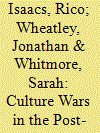| Srl | Item |
| 1 |
ID:
180488


|
|
|
|
|
| Summary/Abstract |
In the last decade the term culture war has become hard to avoid. If it is not yet the buzzword of the first part of the twenty-first century, it soon will be. Culture wars seem to be around us everywhere. Each passing week brings some new mention of an outbreak in a public institution, civic space or political arena in some part of the globe. Culture wars are the phenomenon we cannot seem to shake. Battle lines are drawn, rhetorical tools are sharpened and social media awash with vitriol and moralising, and seemingly unbridgeable social gaps. If the immediate post-Cold War period did usher in an era of universal global liberalism, decades on it is now far in the distance, only visible in the rear-view mirror. Instead, around us lie social and political fault lines featuring competing visions of what should be the appropriate normative basis upon which societies should be constituted. They are debates that focus on belonging, on citizenship, on rights and identities.
|
|
|
|
|
|
|
|
|
|
|
|
|
|
|
|
| 2 |
ID:
170182


|
|
|
|
|
| Summary/Abstract |
Protest performances inside parliament during 2012–2016 articulated claims to uphold democracy that contributed to the maintenance of pluralism in Ukraine during attempted authoritarian consolidation. Simultaneously, such protests were para-institutional instruments in the ongoing power struggle engendered by a patronal system where formal institutions and norms weakly constrained actors. A diverse repertoire of protest, including rostrum-blocking, visual protest, withdrawal, auditory disruption, somatic protest and spectacle, was used frequently and adapted in response to changes in the political opportunity structure. Innovations to the repertoire drew on and modified performative methods used by social movements.
|
|
|
|
|
|
|
|
|
|
|
|
|
|
|
|
| 3 |
ID:
097764


|
|
|
|
|
| Publication |
2010.
|
| Summary/Abstract |
Conceptualising Russia as a neopatrimonial state directs attention to the patrimonial relations that pervaded formal institutions to reveal increasing tensions within the state during Putin's presidency. A case study of parliamentary oversight practices points to the emergence of legitimation as their key purpose, but also to the growing contradictions between the controlling and legitimating impulses of Putin's regime. At the same time deputies responded to the changes in their status and influence by moving their resources towards the patrimonial sphere, most notably utilising oversight institutions for direct and indirect private interests-activities tolerated by the regime in exchange for political loyalty.
|
|
|
|
|
|
|
|
|
|
|
|
|
|
|
|